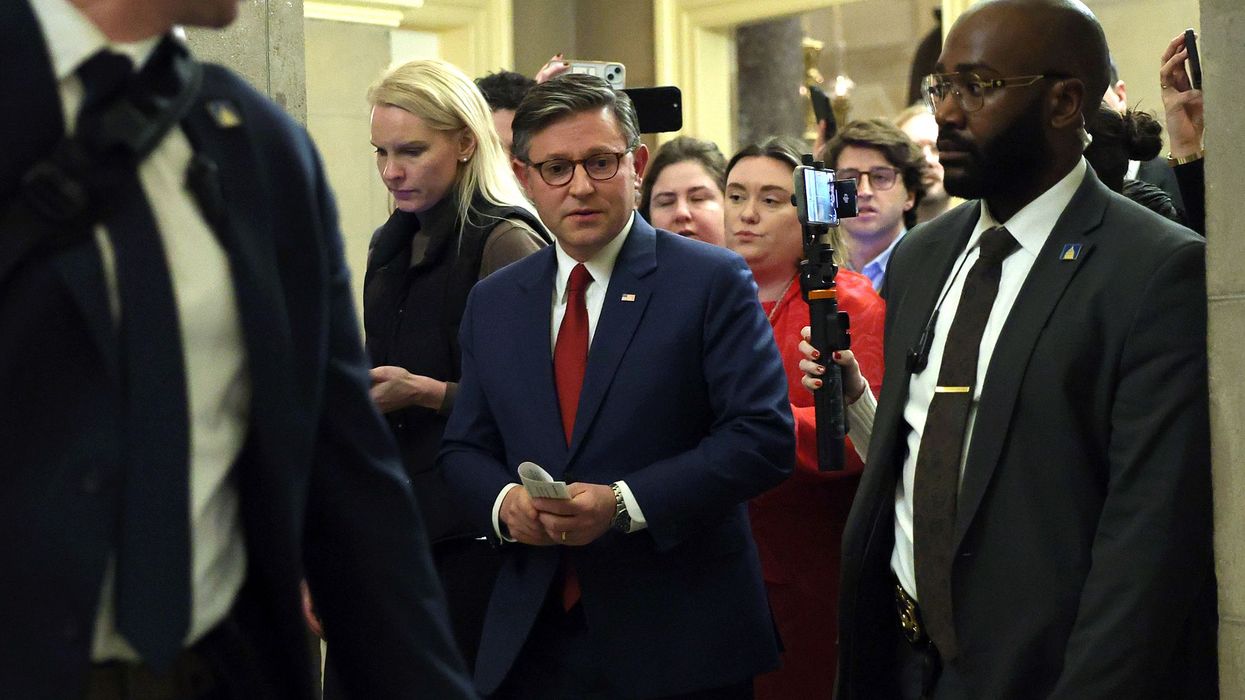September, 02 2009, 03:11pm EDT

For Immediate Release
Contact:
Kawana Lloyd, 202-730-7087
Mark Labor Day with Pledge to Pass Affordable Healthcare and Labor Reform
Nation’s largest healthcare union continues drive for change
WASHINGTON
As
Congress looks ahead to the first Labor Day without the guiding hand of
Massachusetts Sen. Edward M. Kennedy, the Service Employees
International Union (SEIU) called on Congress to mark the holiday with
a renewed pledge to bring affordable healthcare and meaningful labor
law reform to working families.
"This Labor Day, nothing is more critical to working families-and we could do no greater honor to Senator Kennedy's memory-- than passing the sort of health insurance reform that would make him proud. The
bottom line is simple: we cannot restore economic balance and bring
prosperity to all Americans without drastically bringing down
healthcare costs and ensuring that all Americans are guaranteed
quality, affordable healthcare," said SEIU International President Andy
Stern. "And we cannot do it without Congress's leadership."
On Labor Day weekend, SEIU will participate in large-scale events across the country to call for healthcare reform,
including this Saturday, Sept 5, when thousands will gather in
Indianapolis, and on Monday, when SEIU will join with President Obama
in Cincinnati.
The
events are merely the latest actions from the nation's largest
healthcare union, whose 2.1 million members have played a leading role
in bringing healthcare to the forefront of the Congressional agenda and
the national debate. Since recess began, SEIU members and activists
have participated in more than 300 town halls and hundreds of other
events-from candlelight vigils to neighborhood canvasses.
"If
we don't solve our national healthcare crisis, we will put the American
Dream permanently out of reach for millions of Americans," said SEIU
Secretary-Treasurer Anna Burger. "Working with President Obama and
leadership in Congress, we have made great strides for working
families. But the skyrocketing costs of healthcare, if not addressed
immediately, threaten to virtually eliminate the other gains we've
made."
SEIU's
leadership in the healthcare debate can be traced back to the early
days of the 2008 election, when SEIU hosted the first presidential
forum on healthcare-ensuring that every serious Democratic primary
candidate had a serious healthcare reform proposal. Post-election,
SEIU's Change that Works campaign has mobilized thousands of people
across 35 states to keep the pressure on lawmakers to keep their
campaign promises to reform our healthcare system.
SEIU is also continuing its fight for meaningful labor law reform. On
September 10, nearly 300 progressive activists from across the country
will fly to Washington to lobby on the Employee Free Choice Act. The law would allow workers to bargain with their employers for job security, better healthcare and retirement benefits.
Since
President Obama took office, SEIU members have made great strides
towards restoring the American Dream for working families, including:
- Helping President Obama pass the
historic State Children's Health Insurance Program (SCHIP) legislation,
covering nearly 11 million children;
- Passing the Act Lilly Ledbetter Fair Pay Act and executive orders that leveled the playing field for all workers;
- Shedding light on corporate
irresponsibility by continuously revealing just how big banks helped
drive our economy into the ground with failed financial models that
make CEOs richer at the expense of shareholders, workers, and our
economy.
- Urging the White House and Congress to quickly pass the American Recovery and Reinvestment Act.
With 2 million members in Canada, the United States and Puerto Rico, SEIU is the fastest-growing union in the Americas. Focused on uniting workers in healthcare, public services and property services, SEIU members are winning better wages, healthcare and more secure jobs for our communities, while uniting their strength with their counterparts around the world to help ensure that workers--not just corporations and CEOs--benefit from today's global economy.
LATEST NEWS
House GOP to Skip Town Early for Holiday Recess as Healthcare Premiums Soar, Epstein Files Loom
"The same GOP that voted last summer to give the richest Americans and most profitable companies trillions of dollars in tax cuts somehow can't find the funds this winter to ensure 20 million Americans can afford their health insurance."
Dec 18, 2025
The US House was originally scheduled to be in session on Friday, but the Republican leadership gave members a green light to skip town on Thursday for the two-week holiday recess without voting to prevent massive health insurance premium hikes for tens of millions of Americans.
The decision to let members leave early came after House Democrats secured enough support from swing-district Republicans to force a vote on legislation that would extend Affordable Care Act (ACA) subsidies that are set to expire on December 31, sending premiums soaring.
Democrats on Wednesday demanded an immediate vote on the proposed three-year extension of the ACA tax credits, but Republicans instead pushed to the floor and passed their own healthcare bill that would leave around 100,000 more Americans uninsured per year over the next decade—on top of the millions set to lose coverage due to the expiration of the enhanced subsidies.
The GOP bill is doomed to fail in the narrowly Republican-controlled Senate, which voted down a Democratic push for an extension of the subsidies earlier this month.
More than 20 million Americans relied on the tax credits to afford health insurance. With their expiration, ACA marketplace premiums are set to more than double on average, pricing many people out of coverage entirely.
"Congressional Republicans could have followed through on their promises to help families afford the basics by extending the premium tax credit enhancements to help them enroll in affordable, comprehensive coverage. Instead, they recycled old ideas, refused to address the current affordability crisis—and made plans to go home," Sharon Parrott, president of the Center on Budget and Policy Priorities, said in a statement Wednesday.
"On the brink of this deadline, some Republicans have recognized that the stakes for families are too high to do nothing," Parrott added, pointing to the four GOP lawmakers who signed the discharge petition. "A House bill to extend the premium tax credit enhancements now has the required signatures on its discharge petition to force a vote on the House floor. Republican policymakers should step up and put the needs of individuals and families first."
"If Speaker Johnson refuses to bring forth the vote, he’s telling the American people loud and clear that rising healthcare costs are acceptable to him."
It's unclear when the discharged House Democratic bill will get a vote, as the chamber is not scheduled to return until January 6, 2026—after the ACA tax credits expire.
"If Speaker Johnson refuses to bring forth the vote, he’s telling the American people loud and clear that rising healthcare costs are acceptable to him," said Rep. Jasmine Crockett (D-Texas), who is running to unseat Sen. John Cornyn (R-Texas) in next year's midterm election.
David Kass, executive director of Americans for Tax Fairness, said in a statement Thursday that "instead of siding with millions of everyday Americans, they voted to increase healthcare costs which will now put affordable coverage out of reach for millions."
"Congressional Republicans once again revealed whose side they're on," said Kass. "The same GOP that voted last summer to give the richest Americans and most profitable companies trillions of dollars in tax cuts somehow can't find the funds this winter to ensure 20 million Americans can afford their health insurance."
The House Republican leadership's decision to start the holiday recess also came ahead of the Friday deadline for the Trump administration to release most of the Epstein files, as required by recently enacted legislation.
"View all political developments for the rest of the week in light of the fact that the Epstein files are supposed to be released on Friday," said Rep. Alexandria Ocasio-Cortez (D-NY). "House Republicans just suddenly cancelled congressional session Friday and are sending everyone home Thursday evening."
Keep ReadingShow Less
63% of US Voters Oppose Attack on Venezuela as Trump's March to War Accelerates
The new poll comes as the US president openly plots to seize Venezuela’s oil supply.
Dec 18, 2025
President Donald Trump has taken increasingly aggressive actions against Venezuela in recent weeks, but a new poll released Wednesday shows US voters are not on board with a new war.
A new poll from Quinnipiac University found that 63% of voters oppose military operations inside Venezuela, with just 25% registering support.
What's more, a US military strike in Venezuela would draw significant opposition even from Republican voters, 33% of whom told Quinnipiac that they would oppose such an action. Eighty-nine percent of Democratic voters and 68% of independent voters said they were opposed to a US military campaign in Venezuela.
Trump's policy of bombing suspected drug trafficking boats in international waters, which many legal experts consider to be acts of murder, drew significantly less opposition in the new survey than a prospective attack on Venezuela, but it is still unpopular, with 42% in favor and 53% opposed.
A potential war is also unpopular with Venezuelans, as a recent survey from Caracas-based pollster Datanalisis found 55% opposed to a foreign military attack on their nation, with 23% in favor.
The Trump administration's boat strikes, which have now killed at least 99 people, have been just one aspect of its campaign of military aggression against Venezuela. The US military last week seized a Venezuelan oil tanker, and Trump has said that it's only a matter of time before the military launches strikes against targets inside the country.
Trump on Wednesday also said that one goal of his campaign against Venezuela would be to seize the country's oil supply.
“Getting land, oil rights, whatever we had—they took it away because we had a president that maybe wasn’t watching,” Trump said while talking to reporters. “But they’re not gonna do that. We want it back. They took our oil rights. We had a lot of oil there. They threw our companies out. And we want it back."
Venezuela first nationalized its oil industry in 1976, and the US has no legitimate claim to the nation's petroleum supply.
Keep ReadingShow Less
AOC Dismisses Premature 2028 Polls, But Says ‘I Would Stomp’ JD Vance
A survey this week showed the congresswoman leading the vice president 51-49 in a hypothetical presidential matchup.
Dec 18, 2025
Rep. Alexandria Ocasio-Cortez gave a cheeky reaction after a poll suggested that she'd slightly edge out Vice President JD Vance in a hypothetical presidential election in 2028.
The survey of over 1,500 registered voters, published Wednesday by The Argument/Verasight, showed Ocasio-Cortez (D-NY) leading Vance 51-49 and winning back several key voting demographics that propelled Trump's return to the White House last year.
As she walked out of the Capitol building Wednesday evening, the Bronx congresswoman was asked about the poll by Pablo Manríquez, the editor of Migrant Insider.
She responded to the question with a laugh: "These polls three years out, they are what they are. But, let the record show I would stomp him! I would stomp him!" she said before getting into her car.
Neither Ocasio-Cortez nor Vance has officially announced a presidential run. But Vance is considered by many to be a natural successor to President Donald Trump. The president and his allies have suggested he could run for an unconstitutional third term.
Ocasio-Cortez, meanwhile, is reportedly mulling either a presidential run or a bid to take down the increasingly unpopular Senate Minority Leader Chuck Schumer (D-NY).
More than two years out from a Democratic primary, Ocasio-Cortez is considered a likely choice to fill the progressive lane in 2028, with support for increasingly popular, affordability-focused policies, including Medicare for All.
However, despite her strong support among young voters, early polls show her behind California Gov. Gavin Newsom and former Vice President Kamala Harris for the Democratic nomination.
Wednesday's poll showed that in a hypothetical contest against Vance, Newsom had a 53% to 47% edge, a margin only slightly larger than Ocasio-Cortez's.
Keep ReadingShow Less
Most Popular


